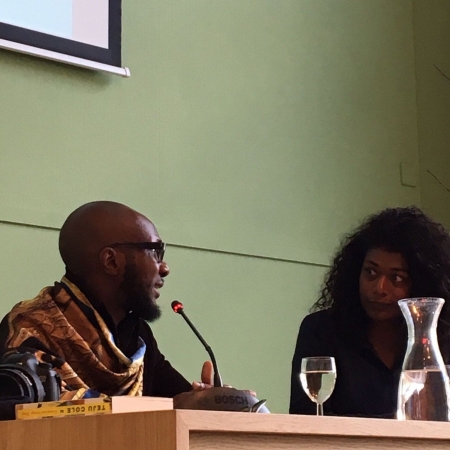Geen witte wijn. Over Teju Cole
Wat is de rol van een literair tijdschrift in de anti-racismebeweging? We zijn in gesprek en werken eraan. Misschien is het simpelweg: veel lezen, erkennen, schrijven en een podium bieden. Vandaag herlezen we Daan Stoffelsens stuk over Teju Cole.
*
Hij is geestig, intelligent, fel: de gedroomde publieke intellectueel. Ik schudde vrijdagmiddag in Spui25 Teju Cole’s hand, en luisterde. Over racisme, over de ondervertegenwoordiging van vrouwen, over smaak en cultuur, over hoe je over de tactics van zwarte activisten van mening kunt verschillen en over white privilege / supremacy. Interessant, maar ook ongemakkelijk. En ongemak leidde, bij mij althans, tot een gevoel van onmacht. Ik heb er al wel over geschreven, maar mijn macht is beperkt tot lezen, kijken, schrijven. Wel leerde ik, die middag en avond, dat verder kijken dan je neus lang is, kan helpen. Bij dezen: welke nieuwe (literaire) stemmen moet ik lezen, welke moeten een podium krijgen in De Revisor? [In 2016 werd voor de beste inzending de fles rode wijn in het vooruitzicht gesteld die Stoffelsen kreeg voor zijn praatje. – red.]
(Plus: mijn praatje en zeven aantekeningen.)
- Coles Spui25-lezing was ijzersterk (hij is hier terug te kijken en terug te lezen bij De Groene Amsterdammer). Hij gaf zijn eigen interpretatie bij een prachtig koningsmasker uit Ife (hedendaags Nigeria), beschreef de eurocentrische receptie ervan, Bellows uitspraken over de ‘Tolstoy of the Zulu’s’, diens uitspraken in zijn Nobelprijsrede, en toonde zich in het slot evenzeer activist als kunsthistoricus. Dat is de mildere Cole, die ook in Nooit meer slapen geïnterviewd werd. Deze week in De Groene Amsterdammer. Zie ook mijn recensies van Coles boeken, fragmenten en vertalerstoelichting bij Athenaeum.nl.
- Voor het gesprek met Stephan Sanders volstaat het mijn praatje hieronder en dat van Quinsy Gario na elkaar te lezen; het ging bij hem alleen over Coles essay ‘Black Body’ (alsof er geen lezing was geweest, alsof Vertrouwde en vreemde dingen niet vijftig essays bevat), en, na een ingreep van een goed geïnformeerde Cole, over racisme in Nederland.
- Gario’s kritiek is zinnig, en werd bevlogen uitgesproken, al geloof ik dat ik blij ben dat De Groene Amsterdammer het oneens met zichzelf kan zijn.
- Net als Gario werd ik niet betaald voor mijn verhaal, het was ‘free intellectual labor’ met de kans een idool te ontmoeten en zichtbaar te zijn in een relevant netwerk. Maar de kwestie dat de culturele en journalistieke infrastructuur jonge makers en stagiaires slecht of niet betaalt is hoogstens complementair aan Gario’s klacht dat zwarte makers geen plek krijgen in die infrastructuur – het doet er niet aan af. Het gaat niet om Gario of Stoffelsen, maar om het feit dat er al heel veel witte mannen beeld- en woordbepalend zijn.
- Inderdaad, mannen. Schuldig. Maar we werken eraan.
Teju Cole: “Like most men I don’t read enough women. If you don’t start to think about it, you’ll end up with a long list of men.”
— SPUI25 (@SPUI25) September 23, 2016
